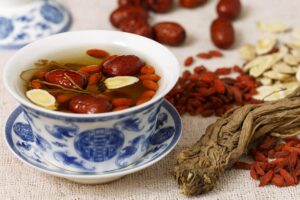Table of Contents
Astragalus Root: Benefits, Uses, and Health Insights
What Is Astragalus?
Astragalus root, derived from the *Astragalus membranaceus* and *Astragalus mongholicus* species, is a powerful herb celebrated in Traditional Chinese Medicine (TCM) for its immune-boosting and stress-combating properties. Known in China as *huang qi* or “yellow life energy,” its medicinal use spans thousands of years.
The plant belongs to the legume family and is native to northern and eastern China, Mongolia, and Korea. Its roots are harvested from plants at least four years old, ensuring their active compounds, such as saponins, flavonoids, and polysaccharides, are potent and beneficial.

Astragalus Root: Benefits, Uses, and Safety Tips
Key Components of Astragalus Root
Astragalus root owes its medicinal properties to three primary compounds:
- Saponins: Known for reducing cholesterol, boosting immunity, and preventing cancer.
- Flavonoids: These antioxidants protect against heart disease and oxidative stress while supporting cellular health.
- Polysaccharides: Renowned for their antiviral, antimicrobial, and anti-inflammatory effects.
Top Health Benefits of Astragalus
1. Anti-Inflammatory Properties
Inflammation is a key contributor to conditions like arthritis and heart disease. Astragalus root, rich in saponins and polysaccharides, reduces inflammation, supports wound healing, and alleviates diabetic kidney disease symptoms.
2. Immune System Support
Astragalus has long been used to regulate immune responses, with studies highlighting its ability to enhance T-helper cell function. This makes it an excellent natural remedy for preventing illnesses.
3. Tumor Growth Inhibition
Research demonstrates the potential of astragalus compounds to slow tumor growth, especially in chemoresistant liver cancer cases. It may also improve chemotherapy efficacy when used as a complementary therapy.
4. Cardiovascular Health
The flavonoids in astragalus protect arteries from plaque buildup and manage blood pressure and triglycerides, reducing the risk of heart diseases such as stroke and heart attacks. It also helps regulate calcium levels to minimize heart muscle damage during a heart attack.
5. Diabetes Management
Astragalus improves insulin sensitivity and protects pancreatic beta cells, aiding in the natural management of type 1 and type 2 diabetes. Additionally, it supports kidney health in diabetic patients.
Additional Benefits
- Promotes healthy aging by combating oxidative stress.
- Speeds up wound healing and minimizes scarring.
- Alleviates chemotherapy side effects such as nausea and bone marrow suppression.
- Treats colds, flu, and chronic asthma when used regularly.
How to Use Astragalus
Astragalus root is versatile and available in various forms, including teas, capsules, tinctures, and topical creams. It can also be combined with other herbs like ginseng or licorice for enhanced effects. Consult your healthcare provider for personalized dosage recommendations.
Precautions and Side Effects
While generally safe, astragalus may interact with certain medications, such as immunosuppressants and lithium. Pregnant or nursing women and individuals with autoimmune conditions should seek medical advice before use.